Fighter from time immemorial

“Patriotism was such an integral part of his whole being,” Shantiben Patel tells me over the phone, her voice laced with nostalgia as she remembers Dayal Kesry.
Nearly 81 years ago, this time of the year, her father was engaged in the freedom struggle in the western Indian state of Gujarat.
On August 22, 1942, the late Dayalbhai and his friends snatched three guns and batons from the colonial police during a skirmish, caused due to the police using violence on a peaceful gathering, in Matwad village, about an hour’s drive from Surat. He was later incarcerated on February 19, 1943.
He eventually managed to escape, but after returning to New Zealand he engaged in another struggle—to pass on the legacy of the freedom struggle.
Born on 3 March 1919 in Gujarat, Dayalbhai first moved to New Zealand in 1931 and completed his primary schooling in Waitara. He made several trips to India in the 1940s, before finally settling in New Zealand in 1954.
The Indian government officially recognised him as a freedom fighter, but he did not stop serving his motherland.
In his book, he wrote in Gujarati, he recalled how he fought the authority of the colonial police, when on 22 August 1942 the police used violence to disperse a peaceful procession. Dayalbhai and his colleagues snatched the batons and three guns from the police and were injured in the skirmish as well. He quite literally had the battle scars to prove it.
The village of Delwada in the state of Gujarat provided refuge to hundreds of freedom fighters, including Mr Keysri himself. It was he, along with Prabhaubhai Chhibabhai Patel, or PC Patel, who decided to erect a monument at Delwada, commemorating those freedom fighters.
“Dayalbhai Kesry and PC were very similar. The idea occurred to them at the same time that there must be a national monument in Delwada…Also, future generations will know about freedom fighting and what part their elders and forefathers took in it and the history of it”, reads an extract from his book.
He put forward the idea for a monument in Delwada in 1995, upon his return to New Zealand, to his friends. They formed a committee, led by Mr Chhotubhai Sima of Matwad. Mr Keysri then went back to India after the funds were raised, and the statue was inaugurated on 26 January 1997. The inauguration was also attended by Indians from New Zealand, England, Canada, and South Africa.

A visitor poses in front of the independence memorial at Delwade, Gujarat, that Dayalbhai helped build (Supplied photo)
“Patriotism was such an integral part of his whole being." recalls his daughter Shantiben. "I remember him taking us to India in 1965 and making a point of taking us to visit all the people who had provided sanctuary for him whilst he was absconding from prison."
Dayalbhai also succeeded in passing on memories of the freesom had won the struggle to his future generations in Aotearoa.
“[My fondest memories] would be of listening to stories of their freedom fighting days, of being in jail, creating friendships, and knowing those people and having a relationship with those people”, says Shantiben.
Perhaps Dayalbhai’s most important contribution towards the fight for independence has been to preserve its memory for generations to come, since his demise on 5 November 2008.
“His mind was working all the time, ‘How can we produce this sort of thing?’ so that the young generation can have a look at the history”, says Natubhai Patel, Dayalbhai's son-in-law, of his book.
“History never dies”, he says.




